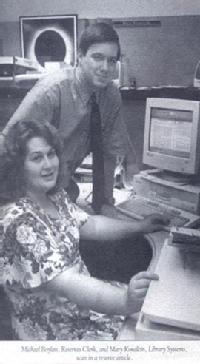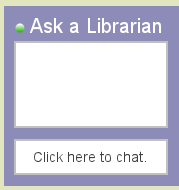Services & Policies - Fall 1999
Library Begins Electronic Reserves
- The World Wide Web has had a significant impact on how library users expect to access information. To follow the evolutionary trail, at one time abstracts were a vast improvement over indexes because the user had a synopsis of the content of the item cited. When these indexes became available over DIALOG, a collection of databases searched by a specially trained librarian, users were delighted despite
 the fees for connect time and printing. Next came CD-ROMs on standalone workstations, and users could conduct their own searches and play with how they wanted to retrieve information. When CDs were networked and users could access information from any computer on campus and later, by password, from home, everyone was delighted. When full-text of articles was added there was great joy. At this point in the evolution of access, there is a growing sentiment that more, if not all, information should he full-text; after all, the Internet is full-text.
the fees for connect time and printing. Next came CD-ROMs on standalone workstations, and users could conduct their own searches and play with how they wanted to retrieve information. When CDs were networked and users could access information from any computer on campus and later, by password, from home, everyone was delighted. When full-text of articles was added there was great joy. At this point in the evolution of access, there is a growing sentiment that more, if not all, information should he full-text; after all, the Internet is full-text. - The advent of Electronic Reserves will satisfy this feeling for Library users who come to the Reserve/Circulation Desk to borrow required reading for their courses. Through the Montrone Foundation, the University of Scranton and Marywood University have received a grant to purchase ERes equipment from the DocuTek Company. Faculty have been invited to participate in a pilot project using this system during the fall semester. In the spring, the system will he available for all applicable reserves. The ERes hardware and software allows articles, poems, etc. that fall within copyright fair use restrictions to he scanned into a file. Mary Kovalcin, Library Systems staff, is performing the scanning. A page is created listing the readings for a course. The professor for that course will distribute a password so that access can be restricted to students in that course. The Montrone grant also includes funds to pay the copyright royalty fees so that materials can be returned to reserve in succeeding semesters. Availability of reserves over the Internet provides twenty-four hour access from any computer. This benefit will be especially significant for distance learning.
- The ERes software also has the ability to post news bulletins, chat and e-mail. Reserves can be linked to professors' homepages. The interactive 'nature of information processing, mentally and via computers, is facilitated.
Bonnie Strohl

